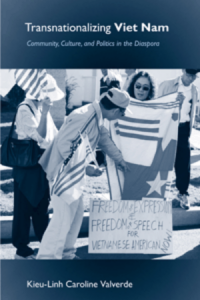How can we begin to understand the transnational ties that bind us both to the United States and Vietnam? How do ordinary people negotiate an identity that is often contradictory and confusing, vexing and controversial? Can one book answer all the necessary questions about transnationalism in Vietnamese America or is this the beginning of a fruitful conversation?
[Do you enjoy reading diaCRITICS? Then please consider subscribing! See the options to the above right, via email and RSS]
Kieu-Linh Caroline Valverde’s Transationalizing Viet Nam: Community, Culture and Politics in the Diaspora begins with a Vietnamese American lawyer composing an e-mail from his home in Virginia. The email is to a moderated newsgroup made of overseas Vietnamese professionals as well as non-Vietnamese members interested in Vietnam-related issues. The man is nervous because the email group can be highly critical of ideas, yet he is optimistic because government officials in Vietnam also subscribe to the newsgroup and receive his messages. It is these people in particular—Vietnamese Communists—that he hopes will read his message carefully and enact changes in his homeland. He sends the email and waits for an answer.
For a work looking at transnational issues, the book starts intimately. Yet this is precisely the kind of phenomenon Valverde wishes to explore: the lives of Vietnamese in the diaspora in their attempts to both connect back to their country to origin and negotiate new lives and communal identity in their host country (in this case, the United States).
Born in Vietnam to Eurasian parents and emigrating before the fall of Saigon, Valverde has personal interest in this research and leaves no stone unturned. Indeed, Transnationalizing Viet Nam is a book 20 years in the making and captures and analyzes not only intimate moments, but also historical moments in Vietnamese American history: the election of Madison Nguyen and the Little Saigon controversy in San Jose; the protest of Chau Huynh’s artwork and the boycott of the Westminster-based newspaper Nguoi Viet Daily for publishing it; the 2009 police attack on Vietnamese national Phuong Ho and the Vietnamese-American mixed reaction to it.
Among the accomplishments of the book is that Valverde succeeds in connecting individual lives to bigger issues of community identity negotiation—what we are and how we are to express this. The second chapter, “Popular Music: Sounds of Home Resistance and Change” starts as intimately as her first. This time a family watches the popular Vietnamese diasporic variety show Paris by Night. Yet Valverde quickly links such entertainment productions and acts of consumption to early Vietnamese cultural development in the United States and acts of transnational collaboration, a miracle given early icy relations between the new Communist nation and its former enemy. Valverde cites transnational music as not only sources initial to community building both locally and transnationally, but sees it as transnational moment continuing today that is producing new Vietnamese music on both sides of the Pacific.
Likewise, argues Valverde, Vietnamese and Vietnamese-Americans are still working as activists and agents of change while on different continents. With the advent of the internet came more ways for the Vietnamese diaspora to connect to their homeland. The Vietnamese-American lawyer at the beginning of the book is revealed to be participating in VNForum, an email list set up in the early 90s to inform those in diaspora of Vietnam-related issues. The forum quickly grew and directly affected Vietnam’s policies due to Vietnamese government officials who had initially signed on to monitor the group. Though VNForum closed in 2002 due to administrative and content issues, Valverde sees the email group as only the beginning and points to other online forums and blogs as sites of radical transnational change.
In spite of successes in such acts of collaboration in an increasingly globalized world, Valverde warns us that the transnational experience of the Vietnamese disapora is a struggle. “The term diaspora tends to evoke a sense of positive connections to a homeland,” she writes, “but sometimes a country and parts of its overseas populations do not have good relations; they are instead ideologically hostile to one another.”
Throughout Transnationalizing Viet Nam, three figures are constant threats to the Vietnamese diaspora: the Communist Vietnamese government that is apt to censor communication and idea flow, the American government that has historically been unfriendly to Communist regimes, and anti-communist voices in the diaspora itself. Such entities, argues Valverde, hinder connection between homeland and the diaspora’s continual effort to make a new reality in their new home, though Valverde also hints at sexism and classism at work as well.
Anti-communist voices are a particular target in Valverde’s later chapters, though her accusations are not unfounded. In an interview between Valverde and San Jose city council member Madison Nguyen (now vice mayor) during the Little Saigon controversy, Nguyen recalls being red-baited as a Communist and being called sexist epithets by senior members of the Vietnamese-American community:
“It was the first time I experienced any kind of negativity from members of the Vietnamese American community. They wrote papers and went on the radio calling me a communist and focusing on my physical appearance. I found all of that very hurtful.”
Such attacks are quite surprising yet are repeatedly observed by Valverde, who sees this type of McCarthyism as a self-imposed social control within the community.
Despite this, Valverde remains hopeful. With the eventual victory of Madison Nguyen after slander and a recall election, as well as the work of various Vietnamese American artists such as Chau Huynh, Valverde sees “a new beginning for the Vietnamese-American community—a significant recognition that there is diversity of thought in the diaspora and a willingness to expose malicious acts against individuals.”
Though the study’s time range is broad, covering 20 years, Valverde’s work is still focused. 20 years is what it takes to chronicle a community’s change. The change that Valverde captures is important not only in order to know where we as the Vietnamese-American community have been, but where we are heading. Valverde also contests the idea of Vietnamese-Americans as model minorities bound to eventually assimilate, and instead shows a Vietnamese-American community that is complex and evolving. Valverde’s work is insightful for both academics in area and Asian American studies as well as activists working to give voice to Vietnamese-American community. Transnationalizing Viet Nam is an important and much needed book.
Buy the book here
Transnationalizing Viet Nam: Community, Culture, and Politics in the Diaspora
by Kieu-Linh Caroline Valverde
Temple University Press
198 pages
$74.50
–
Eric Nguyen has a degree in sociology from the University of Maryland along with a certificate in LGBT Studies. He is currently an MFA candidate at McNeese State University and lives in Louisiana.
Kieu-Linh Caroline Valverde claims that the transnational is personal. If so, in what ways do you negotiate the transnational in everyday life?
Please take the time to rate this post (above) and share it (below). Ratings for top posts are listed on the sidebar. Sharing (on email, Facebook, etc.) helps spread the word about diaCRITICS. And join the conversation and leave a comment! [insert question(s) here]





Her view of VC (viet-cong) is very naive but I understand why because ONLY ordinary Vietnameses really know what VC are. ONLY when she is an ordinary Vietnamese living in VN under f–cking communism (not Eurasian) then she may understand VC. No wonder whether she reads the book “Black Like Me” and feels/understands the soul of that faked black man…
RT @annericefights: A Review of Kieu-Linh Caroline Valverde’s ‘Transnationalizing Viet Nam’ http://t.co/9cC0awTW #vietnam #aapi
RT @annericefights: A Review of Kieu-Linh Caroline Valverde’s ‘Transnationalizing Viet Nam’ http://t.co/9cC0awTW #vietnam #aapi
A Review of Kieu-Linh Caroline Valverde’s ‘Transnationalizing Viet Nam’ http://t.co/9cC0awTW #vietnam #aapi